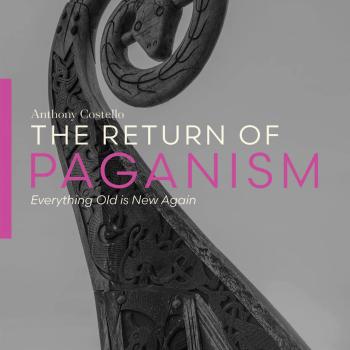In this series, I am arguing that there are three battlefields of human culture upon which a form of Christianity, orthodox Christianity, has failed to successfully contend. Moreover, in failing to do so, this orthodox Christianity will go into rapid decline. Finally, those who continue to profess and practice this form of Christianity will face actual instances of persecution.
In addition, I argued that there is another form of Christianity, Progressive Christianity that will not face the same kind of persecution, if at all. Whether or not this progressive Christianity will also go into decline I am not arguing one way or the other. It seems that the pattern of decline set by mainline Protestant denominations in the 20th century would continue, but it is possible that as the culture changes, new forms of Progressive Christianity could succeed as they adapt to culture. This may be the case too as correlation approaches to theology become more accepted at the higher levels of church governance and in the mainstream.
Nevertheless, the three battles that orthodox Christianity has lost, or nearly lost, are the battles for the senses, for the mind and for the heart of the nation. However, before I lay out why I believe the heart of America has been hardened to an orthodox vision of the Christian faith, a few preliminary thoughts about whether this is all just an exercise in alarmism.
The Rise and Fall of…Just About Anything
The attempt to sketch the decline of something as large as “orthodox Christianity” is, of course, a foolish errand. It would require something like a 1,000 page book to do the topic justice. After all, anyone who does make the attempt should know that such attempts are made with almost every generation. Further, with every successive generation those earlier attempts are usually weighed in the balance and found wanting. They are “over-blown,” “hyperbolic,” and “alarmist” and, in the end, our current generation is doing just fine. Anthony Esolen puts it this way:
Any man who speaks about the collapse of his culture or civilization must meet the charge that the same things have been said by other people in other places and at other times, and yet we are still here–the sun still rises in the east and sets in the west, children are born and grow to adulthood, men and women marry and have children and grow old and die, and nothing is new under the sun. ‘We have heard it before,’ they will say.
Anthony Esolen, “No Option: Clear out the Rubble and Rebuild” (Touchstone, July/August 2020)
Of course, there are three factors which may mitigate the foolishness of my attempt to predict the future: first, I am not suggesting that American culture as a whole will decline, only the orthodox Christian culture in America will. This is not an unusual phenomena. After all, there are countries which have strong cultures, economies and infrastructures, but where Christian orthodoxy is actively suppressed. Take China for instance or perhaps even Canada. Moreover, there are numerous historical examples of orthodoxies being almost entirely lost to whole regions of the globe: Central Asia, North Africa, Russia, etc. The loss of entire Christian cultures is a historical fact, one well documented by historians like Philip Jenkins. Jenkins lays out a basic principle of how Christian cultures have died in his book The Lost History of Christianity:
Churches must adapt, but they face the grave dilemma of just how far to take such accommodation. This is critical when churches are confronted with a powerful and hostile hegemonic culture, creating a society with many temptations to accommodate. Historically, Christians faced the issue of whether to speak and think in the language of their anti-Christian rulers. If they refused to accommodate, they were accepting utter marginality, and cutting themselves off from any participation in a thriving society. Yet accepting the dominant language and culture accelerated the already strong tendency to assimilate to the ruling culture, even if the process took generations.
Jenkins, 245.
Although Jenkins goes on to say he thinks we are “a long way away from any such scenario” like this in the West, I would argue that in the 12 years since the writing of his book things have actually progressed quite rapidly. This acceleration is caused, in part, by the ever increasing biases of our political media and the public emergence of potentially hegemonic ideologies like Critical Race Theory, a view economist Glenn Loury has implied is a “A threat to our civilization” (see at 51.45). The civilization in view, of course, is one all historians agree was mainly grounded in protestant Christianity. However, that Christian orthodoxy should crumble may mean that the broader culture is not far behind. This, as I noted before, was intimated by the former Cardinal of Chicago, Francis George.
Second, is the fact that much of this decline has, in great part, already occurred and has been documented by others, e.g., the Eastern Orthodox author Rod Dreher and the Roman Catholic theologian Ralph Martin, both of whom have made strong arguments about the current crisis for orthodox Christianity in both of those ecumenical traditions.
Finally, to suggest that orthodoxy, the kind of orthodoxy I posited in the first part of this series, is in decline does not mean that all aspects of orthodox Christianity will disappear completely or that there will be no activity, intellectual or cultural, by orthodox practitioners. Orthodox practice can, even under an extended period of suppression and persecution, survive in small amounts. History is far too complex for a total collapse. Esolen points this out again when drawing an analogy between America’s cultural demise and that of Rome:
If, then, I point out our cultural decline, I need not deny that we have antibiotics, or that men do not brawl in bars as often as they used to. Cultural decline is seldom universal. You can usually point out some regard in which things have not collapsed. A slave in the time of Domitian enjoyed more legal protection than did a slave in the time of the noble hero of the Second Punic War, Scipio Africanus, but Domitian was cruel and mad, and the great poet Juvenal, writing in that time, said of the rabble in Rome that all you needed to keep them from rebellion was bread and circuses.
Anthony Esolen “No Option:Clear out the Rubble & Rebuild”
Collapse in Spite of Benefits
Clearly the contemporary church in America, even very orthodox churches, enjoys all kinds of benefits they did not in the past. And clearly our broader American culture has advanced in ways previous generations could hardly imagine. But, we can also detect with relative ease the crumbling of culture more broadly: the decay in the arts, the loss of valuable social institutions and, most profoundly, the rejection of any notion of a national epic or unifying ethos under which all citizens can unite and toward which they can strive. Much of what American Civic Religion used to hold together is now torn asunder, regardless of how one evaluates the rather deistic ACR.
For example, to lament that shows like SNL pass for art and entertainment today, is simply to realize the move from a high to a low culture. Or, to fail to even notice the loss of valuable groups like Rotary club, Knights of Columbus or the Salvation Army (let alone the Boy Scouts), is additional evidence that orthodox Christian culture is in collapse. Even the vanishing of the nobility and nature of sport, i.e., its transcendent aspirations, in the modern arenas of the NBA, NFL and MLB shows how far we have fallen from de Coubertin’s vision and how much closer we are to Juvenal’s dirge.
For the church in this culture, a point Esolen makes poignantly, there is even a noticeable atrophy in its own language and practice. Esolen tells that Pope Gregory after the fall of the Roman culture “was quite aware that his Latin could not match that of the authors in the days of Cicero.” And so too do we realize today that our English cannot match the English in the days of Chesterton or Lewis, just as our preaching today does not match that of Spurgeon or Sheen. Again, however, this is not to say there will be no Chestertons or Spurgeons in our times, only that they are rare and will continue to become harder and harder to find. And I will only make a passing remark about “skinny jeans and fog machines” as replacements for ecclesial vestments and incense.
In sum, taking these three qualifying observations into account: that only orthodox Christianity is in view, that others have documented this cultural demise and that hints of orthodoxy may remain, in spite of major collapse, I find it at least plausible that my fool’s errand may not be quite so foolish.
Orthodox Christianity and Losing the Battle of the Heart
1. Losing the Narrative
“Winning hearts and minds” was a phrase that gained popularity under the counter-insurgency doctrine of Gen. David Petraeus during the Iraq war. The basic idea, although not a novel one, is that it is more important to convince a local population that you are for them, and have their best interests in mind, than actually winning kinetic battles against an armed enemy. In doing so, you pave the way to a strategic victory in an otherwise hostile land, and in a war that cannot be won through sheer force. Winning hearts is compelling a hostile, or at least suspicious, people that you are its liberator, not its oppressor. In convincing hearts you also add allies to your ranks, allies with resources that can aid you in your mission. It is what we have seen come undone recently in Afghanistan (something that was no surprise to most who served there).
It is important here to note that my metaphor breaks down when we think of actual hearts changing in such a way that they become captive to Christ, as in, they become saved hearts. What I am saying here does not relate to theological soteriology, a work that all historical Christians believe can only be initiated by the Holy Spirit Himself. Anything, or anyone, that says otherwise has a special place reserved in the hall of heresy, next to the likes of Pelagius and Socinus.
Rather, winning hearts in this sense has to do with messaging the Christian worldview and the accompanying Christian life in such a way that even those who refuse its ultimate offer of salvation, still appeal to Christianity as a commendable or even indispensable feature of a moral and just human culture. Pascal put it this way, “People almost invariably arrive at their beliefs not on the basis of proof but on the basis of what they find attractive.” That said we can find people in the West, some very prominent people, who while not believers themselves do find Christianity attractive. Further, in finding it attractive, also find it indispensable and, in finding it indispensable, become allies in its defense. I am thinking here of the agnostic author, Tom Holland, who makes a better defense of historical Christianity than many Christians I know of, as well as his countryman Douglas Murray. Neither of these, of course, are Americans.
Some Theological Considerations/Concerns
Of course, if there is a war of wars, one requiring the winning over of hearts and minds, it is the spiritual war over the souls of men. This is a war, as C.S. Lewis once put it, between a “dark power” in the world and the creator of that power. At this point, some might immediately say that the very idea of a dark power that keeps the world in a constant state of cruelty, confusion and death, coupled with the belief in an all-loving creator of that very same power, shows that Christianity’s battle to win the human heart is already lost. Still this kind of skepticism has usually been reserved for the educated elite and philosophers of religion. While this “problem of evil” has been pushed further down and out into the broader culture, especially due to the “New Atheists” of the early 2000’s, in the end there is a subtler face of secularism which lures many away from Christian orthodoxy than Hume’s reformulation of Epicurus’ ancient challenge.
What does seem to be the point of departure for many, is not the difficulty of reconciling an all good and all powerful God with the existence of free moral creatures, but rather the sense that Christianity cannot deliver the goods when it comes to a heart longing to be a part of a greater story. The sense is that the story itself cannot fulfill our deepest longings. There are simply other stories out there, other causes: racial justice, climate change, fair trade coffee, anti-vaping campaigns and now mask wearing that appear more legitimate, more relevant, more immediate and, of course, far less morally restrictive as life goals.
Life Causes, Moral Goodness and “The Immanent Frame”
Many of these causes and movements, all of them perhaps, operate entirely within what Charles Taylor called the “immanent frame.” They attract because, in short, they often are genuinely good moral endeavors that have a sense, or are given a sense, of great urgency. They offer the individual seeker of purpose a meaning that goes beyond their own lifestyle interests and narcissistic wants; at least sort of. There is, as Kierkegaard elucidated, a universal ethic of which we are all aware, and which we long to try to accomplish on our own. We also long to be seen as good by our peers. But, this desire of the “ethical man” to do good and to be good is deficient, for in man’s arrogance and pride he thinks and tries to be it and do it apart from God. It is the originating original sin reproduced in history.
However, this seeking for a cause in the world to which one can attach their existential hopes and alleviate their moral angst, if Christianity is true, is merely apparent. It is not true but merely a projection of the mind. For while any one of those particular narratives, local stories or contemporary causes could be incorporated into the grander narrative of Christianity, Christianity cannot be reduced to fit into their overarching narratives. The problem of course is whether or not people see Christianity as the story in which all others come together, cohere and find their ultimate meaning. Or, alternatively, do we believe Christianity is just one option among a smorgasbord of purpose-giving pursuits. This reminds me of the 1965 George Stevens movie, The Greatest Story Ever Told with Max van Sydow as Jesus. The cast was incredible and the title said it all, even if the film was a dud.
Many are accustomed to hearing about the “bigness of God” in kids’ classes and young adult ministries, but are we able to defend the bigness of Christianity as God’s story? This is often where the heart of the matter lies. This story cannot be detached from the life of the mind and the rigors of the intellect, but the mind and the intellect alone cannot do the cultural lifting necessary to win the war.
Thoughtful Antidotes for Those Sick at Heart
However, far be it for me to cast stones. After all, many great men and women have tried their hand at this task of weaving the art of the Christian faith in culture, and their works have done just that. Whether it be Augustine’s City of God in the 5th century or the worlds of Lewis and Tolkien in the 20th, there have been defenses of the Christian faith that have compelled millions to consider its story.
It is in this creative work that the wonder of Christianity becomes very real to many, the kind of wonder that we only rarely glimpse in America today. Andrew Davidson puts it this way:
It is the work of the apologist to suggest that only in God does our wonder reach its zenith, and only in God do our deepest desires find their fulfillment. The apologist may labour to show that the Christian theological vision is true, but that will fall flat unless he or she has an equal confidence that it is supremely attractive and engaging.
Andrew Davidson, Imaginative Apologetics (xxvi)
It is no “wonder” that many today are drawn to the musings of men like Jordan Peterson, another valiant defender of Christianity who nevertheless remains agnostic. For while Peterson is not entirely inept as a philosopher, it is clearly his use of Jungian archetypes, and his ability to weave back into modern parlance the art and myths of the past that has made him such an impactful prophet of the post-modern era.
Still, there is another arena of the heart that is not won on the battlefield of the imagination. Hearts ultimately are won or lost on the battlefield of relationships. How the orthodox Church has related to the culture it lives in has not been without its problems. In fact, many have earned orthodoxy its justified bad name.
2. Orthodox Christianity and The Loss of Relationships
Inevitably orthodox Christians will lose relationships and that due to their orthodoxy. Jesus told us as much,
If the world hates you, know that it has hated me before it hated you. 19 If you were of the world, the world would love you as its own; but because you are not of the world, but I chose you out of the world, therefore the world hates you. 20 Remember the word that I said to you: ‘A servant is not greater than his master.’ If they persecuted me, they will also persecute you.
John 15:18-20
However, there are ways that one should lose relationships and ways that one should not. Several factors play into any relationship, and the nature or quality of even one relationship usually has a degree of complexity too hard for any single mind to fully grasp. If we could, there would rarely be divorce as therapists would have long ago discovered the secret formula for marital success. Children and parents would never find themselves estranged from each other and fights among siblings quickly resolved.
But, in spite of this complexity, there are always relationships inside the orthodox church that will spoil the story it intends to transmit. This, again, is an inevitability of spiritual war. However, when we see messengers of God, trusted voices of the Gospel, fall from grace, and that through clear-cut forms of abuse, it should not surprise that one result is a turning away of the heart from orthodox Christianity itself (at least, a momentary one). The rejection of Roman Catholicism resulting from the scandal of priestly sexual abuse; the walking away from Evangelicalism on account of sexual immorality or greed among high-ranking members of Protestant churches or ministries; or the myriad other failures of orthodox communities that hold to the high biblical standard all matter greatly. Further, in most cases, healing does not simply occur overnight.
And Then There Is Politics…
Finally, there are corporate relationships that turn away hearts from the orthodox faith. While I reject the notion that it was unjustified or immoral for Evangelicals and traditional Roman Catholics to vote for or support Donald Trump, that that support had a negative effect on the hearts of many Americans cannot be denied. I am not in any way advocating for the idea that “image is everything,” as a once great tennis champ told us. I have argued elsewhere that images often deceive, and we must discern the truth of the inner core over being satisfied with the outer appearance.
Still, I am saying that, whether right or wrong, some things that some orthodox Christians have attached themselves to have caused a stigma. Donald Trump, a man I voted for twice, is part of that current stigma against the orthodox family. How we respond to both his presidency and his loss of the presidency does matter to the Gospel. It is at least worth us considering very carefully. Good moves in the right direction are begin made by folks who do matter to the perception of the Church in America. Still, that strange rallies were held, a major riot had, and that bizarre investigations are continuing, are all deeply upsetting. For while it is good to see a passionate unity of Christian orthodoxy, what we are unifying around and why we are doing it matters just as much.
Orthodox Christianity and Conflating Identities
In The Screwtape Letters, Lewis has Screwtape, the elder tempter, advise his nephew Wormwood on how to divert the focus of the Christian man from his identity in Christ to his political identity. In the days of WWII, Lewis uses the political images of the “Patriot” and the “Pacifist. Today we might say the conservative and the liberal (or leftist) to make his point:
Whichever he adopts, your main task will be the same. Let him begin by treating the Patriotism or the Pacifism as a part of his religion. Then let him, under the influence of partisan spirit, come to regard it as the most important part. Then quietly and gradually nurse him on to the stage at which the religion becomes merely part of the ‘cause’, in which Christianity is valued chiefly because of the excellent arguments it can produce in favour of the British war-effort or of Pacifism. The attitude which you want to guard against is that in which temporal affairs are treated primarily as material for obedience. Once you have made the World an end, and faith a means, you have almost won your man, and it makes very little difference what kind of worldly end he is pursuing.
C.S. Lewis, The Screwtape Letters.” Apple Books.
If our Christian faith becomes merely a part of our political loyalty, and the “World” made our ultimate end, then our heart is for politics instead of for Christ–we are living for the finite, not the eternal. This will be noticed by the eyes and the hearts of the culture around us. To be fair to Trump supporters like myself, this temptation of loyalty to politics over Christ clearly cuts both ways, as Progressive Christianity has for some time now found politics to be a golden calf and an ultimate solution.
The alternative, however, is also not the answer. This is not a call to do nothing politically. That may indeed be to allow evil to triumph, something the abolitionists understood well. That a balance between worldly good sought through lawful means and heavenly good sought through unwordly means must be struck is foundational to the Christian life of faith. But, if one had to err on the side of caution that side should be the heavenly.
In sum, both the failure to capture the cultural imagination for the sake of Christ, as well as the loss in the realm of relationships has resulted in a major blow to the orthodox Christian story that is, in truth, one of goodness, and hope, and beauty. To use the Hebrew idiom, it is the story of stories.

Conclusion: Winning Hearts, Minds and Senses Is Not Up to Us
As difficult as it may be to accept, the truth is our success as orthodox communities to win the hearts, minds, and senses of a nation is ultimately not up to us. Further, in some real sense, that failure is inevitable. Nevertheless, it should be recognized as a mystery– a mystery any orthodox Christian must ponder with great seriousness. We, in the end, do not win the war, at least not in a manner that would afford us to boast of a victory we might consider to have won in our own strength or through our own wits. To depart from this truth would be to move away from the orthodoxy I have been describing and move into the Progressivism I have called its antithesis.
The hope of the orthodox Christian is not to declare victory over a culture or a nation. Our mission is only to participate in the war for a culture or nation’s soul. Should we overstep our bounds in fighting with other than spiritual and morally lawful weapons, we become like the very culture we aim to see transformed. Should we abandon the spiritual weapons we do have to join the culture, we step off of the spiritual battlefield itself and right into the hands of the enemy.
One lesson I learned in Afghanistan, once again a newsworthy topic, was that one could lose the battle to evil men in two ways. First, one could fail to resist their aggression with the proper means of warfare and in doing so cede over the land to those who do evil. Or, one could take on the features of one’s enemy and, in doing so, become similarly evil. I’ll admit, there are times in the course of human history, and in particular moments of great moral complexity, when even the most faithful Christian can be tempted to the breaking point and so participate in real evil. Is this not the reason why we honor the martyrs who resist such temptations?
Therefore, as was even the case with the ultimate counter-insurgent, Jesus Christ Himself, the Word made Flesh who came to live among the enemies of God, victory in this war is never more than partial. This is reported in John’s Gospel, when the eyewitness writes,
The true light, which gives light to everyone, was coming into the world. He was in the world, and the world was made through him, yet the world did not know him. He came to his own, and his own people did not receive him.
John 1:9-11
God Himself came into His own creation, now broken with sin and death, to rescue people from that sin and that death. Yet, not all believed in His liberation and still today many see Him as oppressor and not Liberator. Nevertheless, the things Jesus did were the kinds of things that could and should win the hearts of men and women. Healing the sick, casting out demons and freeing people from the guilt of their own conscience. All acts of genuine love of the other, all expressions of agape love which seeks the ultimate for the other even at great cost to oneself.
Winning the heart, however, is the victory of Christianity in the world. For as I already pointed out, one could lose both the battle of the senses and the battle of the mind, yet if one wins the heart of an individual or group, then Christ has conquered them. For one can have all of the most beauteous and spacious church buildings in the world, or all of the best formulated and most cogent arguments of the Truth, but if neither affects the human heart, then salvation has not been gained and the individual or her community remains lost.
Postscript: Orthodox Christianity and The Mystical Union of The Church
As orthodox Christianity dies in the West we should take comfort in two truths about Christianity and its historical persecutions: first, it is always for the benefit of God’s chosen ones that persecution comes. Phillip Jenkins points out that the church under persecution has often understood the persecution itself as part of a communal soul-building:
Such punishments could be understood as a form of correction from which the society would learn lessons for the future, and from which it would emerge stronger. This was, after all, a society in which fathers were expected to apply strict corporal punishment to erring children.
Jenkins, 251
And errant children we are. Further, we should accept, as orthodox believers, the wisdom and traditions and interpretations of the past. For they are not irrelevant or defunct, no matter our post-modern sensibilities. That God Almighty chastises is a fundamental mystery grounded in the revelation of Scripture. The history of Israel attests to it thoroughly. Through suffering we gain in both purity and wisdom, learning what really matters and how to persevere with the saints.
Second, however, is the more hopeful vision of our trans-historical and eternal connection to all of those who have come before us and suffered, the community of the church militant that wars against powers and principalities as well as flesh and blood throughout time.
Jenkins references a work by Charles Williams regarding this profound truth:
Charles William’s Descent into Hell, […] also deals with themes of martyrdom and, in worldly terms, failure. One of the book’s characters is a sixteenth-century Protestant about to be executed for his faith, but his fear of suffering and pain means that he dreads giving in to his persecutors. He draws courage from a mystical linkage with his descendants, a woman in the twentieth century. The lives of both individuals find meaning and purpose across long centuries that for us demarcate separate worlds, but which have no existence in the mind of God. Such a connection is absurd in terms of secular thought, as God does a miserably poor job of respecting human precision about time and space. But such a story reminds us that long ages of Christian absence that we might clumsily term an ‘eternity’ might in reality be no such thing.
Jenkins, 256
What is it then to the orthodox Christian who might face persecution? It is to his or her benefit that he or she join into full communion with women like Perpetua in the 3rd century or men like Tyndale in the 16th. It is for our good that we enter into the complete fellowship with the 21 Coptic priests beheaded on a beach in Libya in 2015. For it was the beheaded apostle Paul himself, the one who saw Jesus in the Heavens, who said, such present sufferings as these are indeed not worth comparing to the vast weight of glory yet to be revealed.













